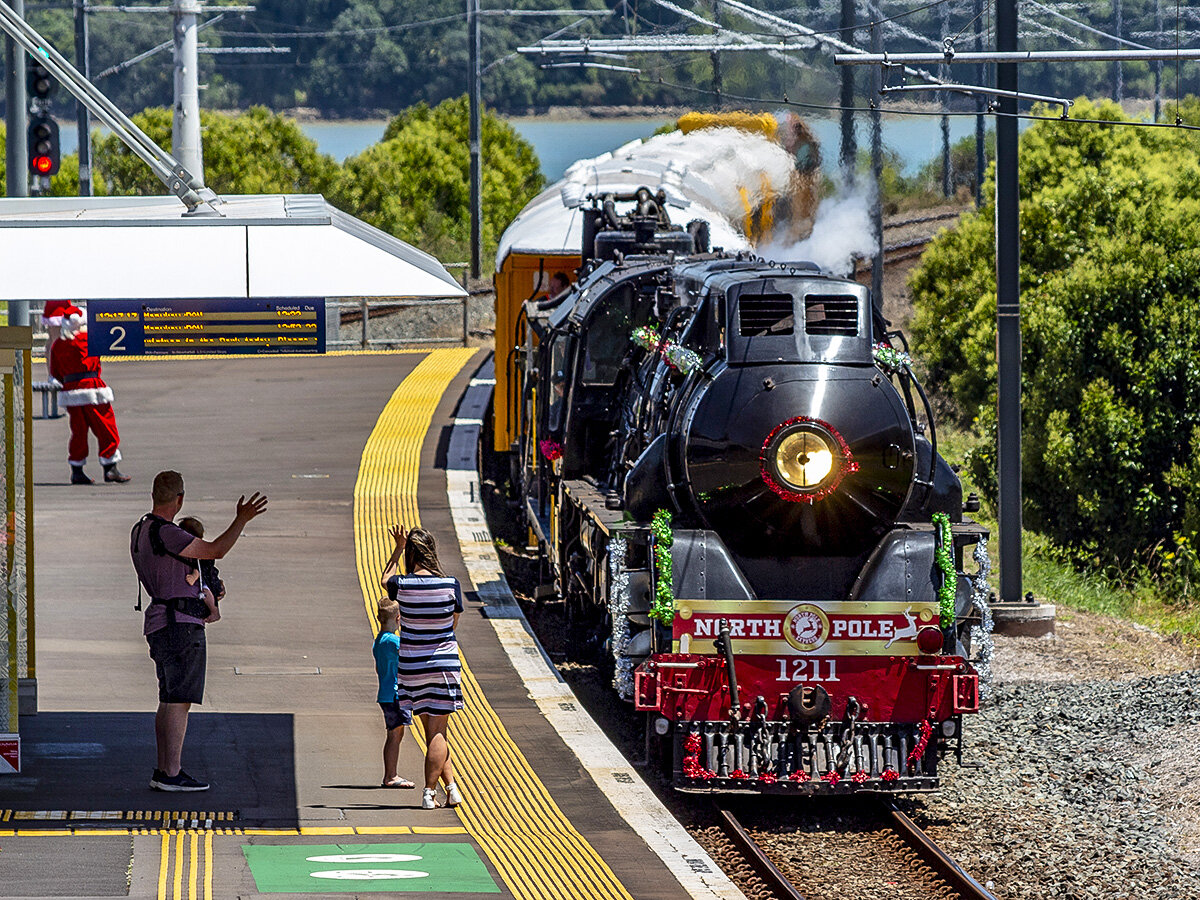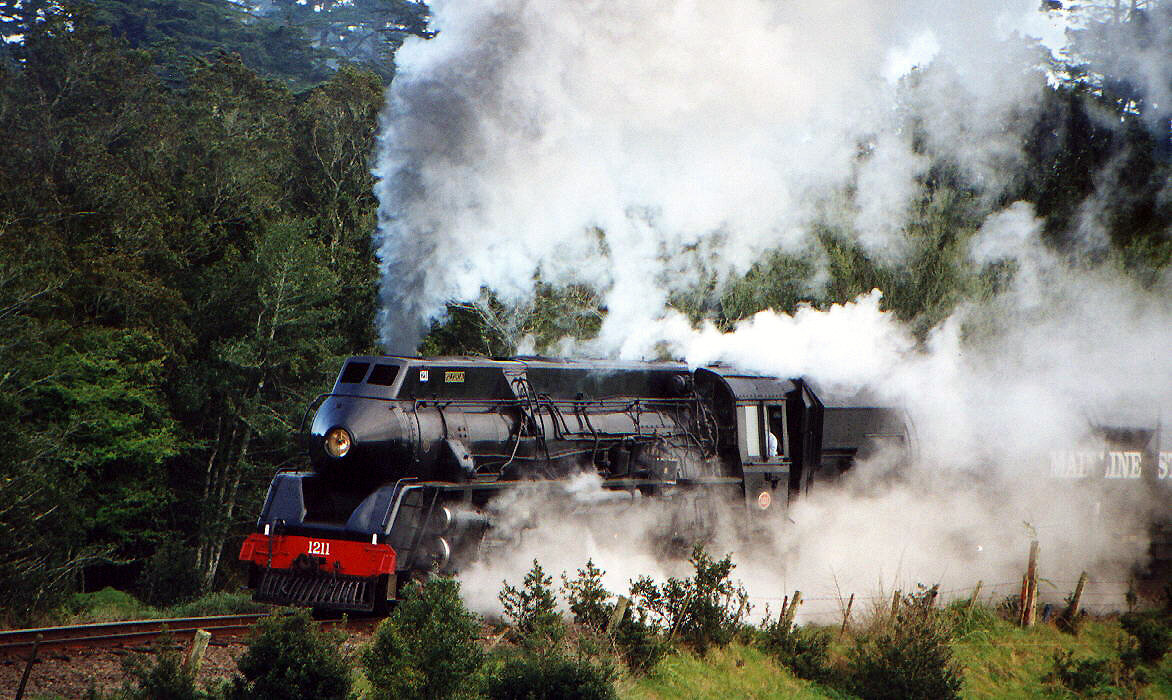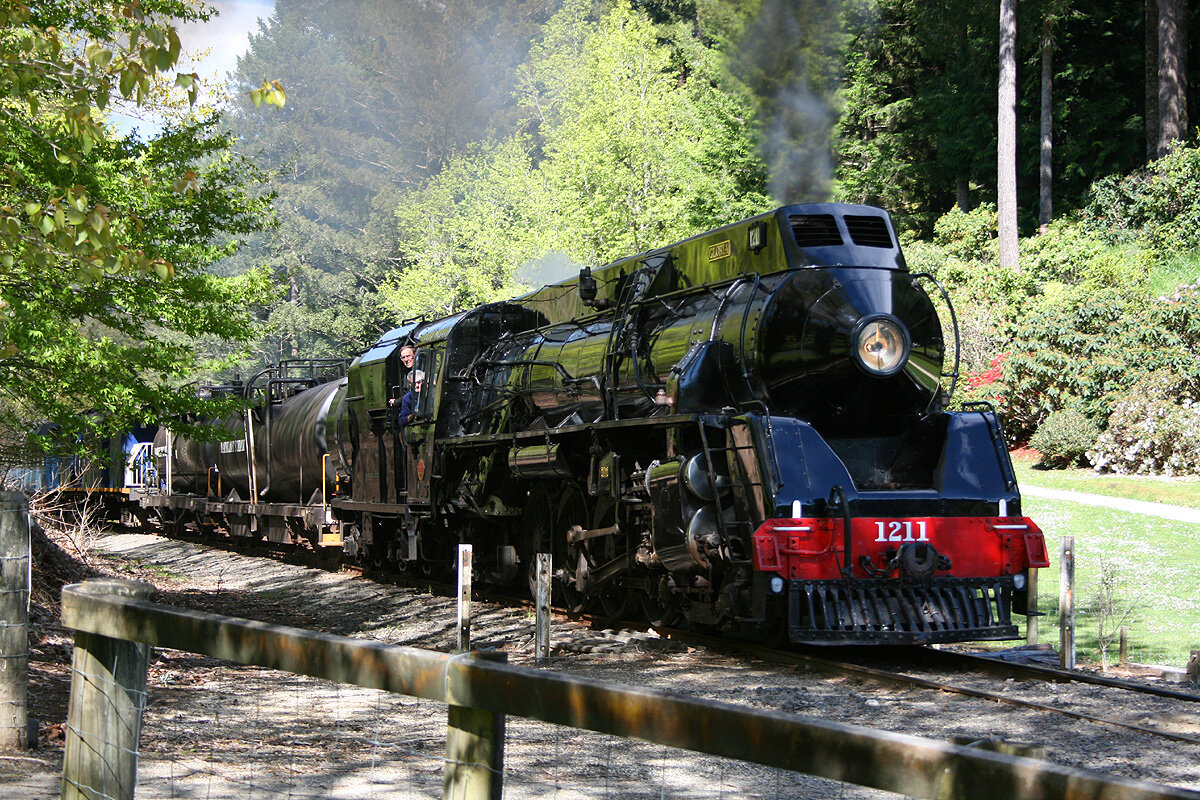J1211
J1211
Details
Wheel Arrangement: 4-8-2
Manufacturer: North British Locomotive, 1939
Builders Number: 24534
Valve Gear: Baker
Cylinders: 18” dia. / 26” stroke
Weight in working order: 108.9 tons
Driving Wheel Diameter: 54”
Boiler Pressure: 200 psi
Tractive Effort: 24.960 lbf
Overall Length: 66ft 11in
J1211 was given maker’s number 24534 by North British, and put into service at Auckland in December 1939. It worked between the Bay of Islands, the Bay of Plenty and Taumarunui, hauling express trains and goods trains. J1211 had her streamlining removed altogether by November 1950 and continued to run in that form until 1988. The streamlining is reinstated now, but has a fully enclosed top, practically eliminating the problems previously experienced. In 1957 an almost-new boiler was fitted, the benefits of which are still accruing today. J1211 stayed in Auckland until replaced by imported Da diesel electric locomo¬tives, and was then transferred to the South Island in October 1963 on the rail ferry Aramoana. J1211 was based out of Dunedin, working the main lines to the north and south of the city, until replaced by Dg and Dj diesel-electric locos in the late 1960’s. In September 1970, J1211 was transferred to Christchurch working solely on express trains, as the carriages required steam heating in the winter months. Her end was not far away, with the arrival of steam-heating vans in late 1971 enabling the NZR to haul passenger trains through the winter with diesel locomotives. J1211 was with¬drawn from service in November 1971.
Determined that the loco would not be cut up for scrap, Ian Welch and two others purchased J1211 for preservation. An engine shed was rebuilt at the old steam depot at Paekakariki by Steam Incorporated to house J1211 and other retired steam locos. In 1974, a couple of years after withdrawal from service J 1211, in the company of sister loco J1234, worked a special delivery train from Christchurch to Picton, and on 19 May 1974 worked from Wellington to Palmerston North and back to Paekakariki. The delivery of the two J locomotives to Paekakariki marked the beginning of the mainline steam preservation movement in New Zealand, as the complex had but a short length of its own track and was established solely on the proviso that steam hauled trains would be allowed to run on NZR tracks in the future. J1211 and J1234 were joined by Ka945 and Wf 386 from Taumarunui, and Ka942 from Hutt railway workshops. Preventative maintenance kept J1211 in working order, able to work on private railways, but not in mainline condition.
In 1985 J1211 was towed north to the Glenbrook Vintage Railway, where some repairs were made to the loco. Late that year, J1211 was towed further north, to Kawakawa, to work the newly formed Bay of Islands Scenic Railway. Initially five return services were operated every day, but were eventually reduced to one return trip a day, and finally to a weekend only service. J1211 per¬formed well, but proved too costly to steam for one trip a day. A smaller 4-4-0T locomotive was leased from Wilsons Portland Cement Works in April 1986, the lease of Jl2ll terminated. She was towed south to Auckland and stored in the railway yards for two years.
In early 1988, Nigel Welch, the son of Ian Welch, returned from a six-month overseas holiday to Eu¬rope and England. He had observed and worked at a number of preservation railway workshops in England and was full of enthusiasm for the overhaul of the steam locomotives he had previously helped restore. J1211 was chosen for overhaul to mainline condition, as ahead in the not-too distant future was the New Zealand Railways 125th anniversary celebrations at Christchurch, with the possibility that J1211 could be used to haul mainline trains again.
The locomotive was stripped down under the supervision of Ted Pointon, an ex-NZR steam driver who is well known for overhauling Glenbrook Vintage Railway locomotives to mainline order. The boiler of J1211 was de-tubed, descaled and inspected by the Marine Department, passing tests in flying colours. The boiler was protected with special purpose paint and new tubes fitted. The suspension, springs and compensating gear was overhauled where required, and the whole loco¬motive given a thorough going-over.
Just one week before the Ferrymead 125 event of October 1988, J1211 was fitted with new streamlining paneling and towed south to Christchurch. The day be¬fore its first mainline trip the loco was given a test-run, from Christchurch to Rolleston return, hauling a long line of diesel locomotives. Its first test steaming since overhaul, the loco passed in flying colours and surprised both public and railway enthusiasts alike, who had not expected to see J1211, let alone a streamlined J.
J1211 on the Napier - Gisborne line above Blacks Beach.




